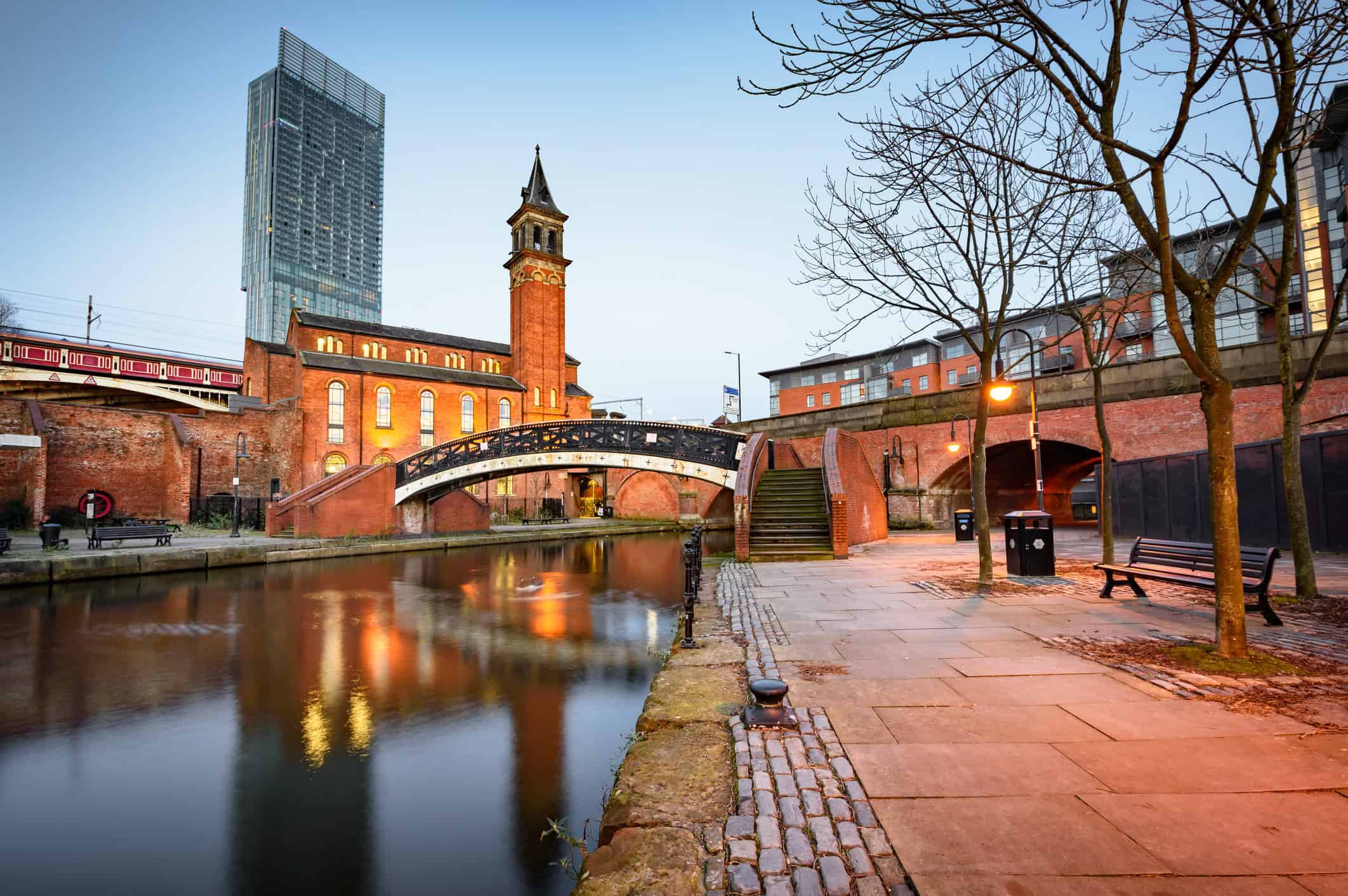
Published: May 30, 2024
Advice for Moving to Manchester
Author: abbie
Published: May 30, 2024
Author: abbie

Moving to Manchester? You’re not alone. According to The Economist’s Global Liveability Index, the city is the UK’s second most liveable city after Edinburgh. And why wouldn’t you want to live here? The city of Manchester is bursting with history, culture and innovation. From The Smiths and Oasis to Joy Division and The Stone Roses, Manchester’s music scene is nothing short of iconic. Add to that the wonder that is LS Lowry, the city’s most celebrated artist, and Anthony Burgess of “A Clockwork Orange” fame. But, before you set your sights on living here, let’s look at some important considerations.
Here’s a breakdown of the key factors to consider when moving to Manchester:
Whether you’re looking for modern high-rises in Spinningfields or a cosy flat in Didsbury, Manchester has something for everyone. There’s everything from trendy city centre apartments to quaint suburban family homes. There are neighbourhoods to suit all budgets and lifestyles so research what you want from where you live and find the best location for you.
Manchester’s climate is characterised by mild summers and cool winters, with plenty of rainfall throughout the year. Be prepared to invest in a good umbrella – the weather can be very changeable! According to data, the rainiest months are December, July and August. Believe it or not, April has the least amount of precipitation and rainy days. But, if you’re moving to Manchester from elsewhere in the UK, you’ll know what to expect from the good old British weather!
Manchester has an extensive and excellent public transport network. It’s one of the UK’s 8 cities to boast trams and the Metrolink tram system is particularly convenient for getting around the city centre and outlying areas. There are 3 main train stations as well as a direct line to Manchester Airport, the 3rd largest in the country. Consider proximity to transportation hubs when choosing your accommodation to make your daily commute as smooth as possible.
Manchester’s economy and job market are thriving. There are plenty of opportunities in a range of industries like finance, technology and healthcare. You can be in London in just over 2 hours too, which makes it a great base for hybrid jobs.
Manchester is home to several major companies and also has a growing start-up scene. Prominent companies like the BBC, the Co-operative Group, Kellogg’s, AO.com, Auto Trader UK and PZ Cussons all have their headquarters in the city.
Students considering Manchester as an option for further education will certainly find their place here. The city has over 44,000 students coming from 170 countries worldwide, which makes it a diverse and interesting place to study. The city’s student population is a big part of Manchester’s cultural and social scene. When choosing your new home, explore the different student accommodation options and think about their locations in relation to your place of study.
No matter your interests, you’ll find plenty to enjoy here. Here’s a glimpse of what Manchester has to offer:
Manchester has an impressive and varied nightlife scene. There’s a huge range of bars, pubs and clubs catering to every taste. From trendy cocktail bars in the Northern Quarter to traditional pubs in Castlefield, there’s no shortage of options for a memorable night out. Deansgate Locks is another hotspot, known for its vibrant nightlife and stylish bars. Manchester’s LGBTQ+ scene is thriving too. Centred around “The Village” and Canal Street, it’s one of the leading gay-friendly cities in the world.
You could spend weeks just exploring all of the museums in Manchester. If you’re interested in learning more about the city’s history and industrial heritage, you can explore the Science and Industry Museum. Manchester Museum is also worth a visit. There are more than 4.5 million objects from natural history and human cultures here. It’s also owned by the University of Manchester, making it the UK’s largest university museum. If you’re into art, there’s Manchester Art Gallery, the Lowry and the Whitworth Art Gallery to name a few.
There are a whole host of legendary music artists originating from Manchester and the music scene is still going strong among the many legendary music venues here. Catch a live gig at the historic Albert Hall, experience intimate concerts at Band on the Wall or dance the night away at the iconic Warehouse Project. There are also plenty of music tours here too. The city’s musical heritage is certainly one to celebrate, making it a must-visit for music enthusiasts.
We can’t talk about things to do in Manchester without mentioning sport. Cheer on Manchester United or Manchester City at Old Trafford or the Etihad Stadium, catch a cricket match at Lancashire Cricket Club or immerse yourself in the thrill of rugby at AJ Bell Stadium. Both football stadiums also have great tours available too if you fancy walking down the players’ tunnel or checking out the changing rooms.
Manchester is the sixth-largest local authority in England by population. The latest census information shows there are almost 552,000 people here, from a range of ethnicities and backgrounds. This gives Manchester and its neighbourhoods a unique charm and character. Here are some of the city’s most popular areas:
Didsbury is located 5 miles south of the centre and has a village-like atmosphere with leafy streets and trendy cafes and bars. This neighbourhood is particularly popular with young professionals and families. There are excellent schools and parks, which gives Didsbury a great balance of city life meets suburban tranquillity.
Manchester’s premier business and leisure destination, Spinningfields is synonymous with luxury living, high-end dining and designer shopping. This neighbourhood’s skyscrapers and waterfront promenades make for a modern and cosmopolitan atmosphere. It’s a great location for those seeking an upscale urban lifestyle.
Deansgate is right in the heart of Manchester. This is a city-centre thoroughfare that’s lined with shops, restaurants and entertainment venues. Its central location makes it an ideal base for city living and it has easy access to transport links and attractions.
Manchester’s Northern Quarter is somewhat of a creative hub. It’s known for its bohemian vibe and is home to plenty of independent shops and an eclectic nightlife. Here, you’ll see a range of street art, cobbled and vintage boutiques and artisan cafés that add to its quirky charm. The Northern Quarter is both vibrant and dynamic; it’s perfect for those who enjoy a lively and artistic environment.
Once upon a time, Ancoats was Manchester’s industrial powerhouse. In recent years, however, it’s transformed into one of the trendiest neighbourhoods in the city. The old mills and warehouses are now trendy cafes, co-working spaces and galleries, which means this area attracts a young crowd. The history combined with modern amenities makes this a unique place to spend your time.
Navigating the cost of living is essential when considering a move to Manchester. Compared to London, Manchester offers a more affordable lifestyle across various aspects:
The cost of housing in Manchester is generally lower than in London, with rental prices and property values reflecting this difference. Whether you’re renting or buying, you’ll likely find more affordable options in Manchester’s diverse neighbourhoods. From spacious apartments in the city centre to charming houses in the suburbs, there’s something for every budget.
From buses and trams to trains, getting around Manchester is convenient and budget-friendly. Monthly travel passes and affordable ticket prices make commuting less of a financial burden compared to the capital.
Utilities and everyday expenses, such as groceries and dining out, are generally more affordable in Manchester compared to London. You’ll find that your money goes further when it comes to everyday essentials and leisure activities. Whether enjoying a meal at a local restaurant or shopping for groceries, the cost of living is notably lower.